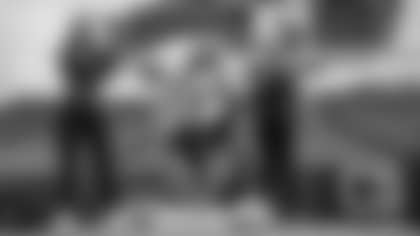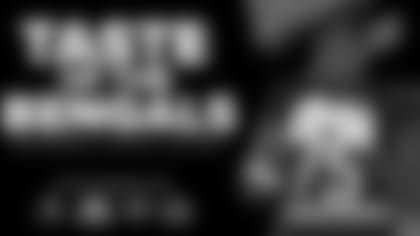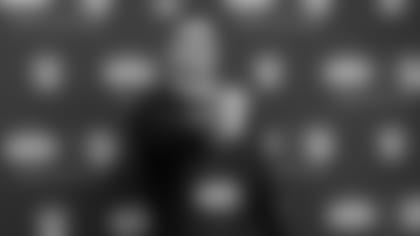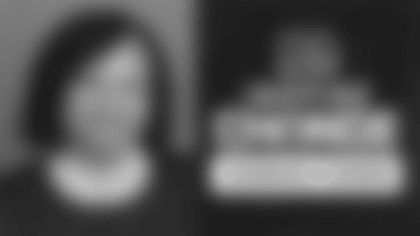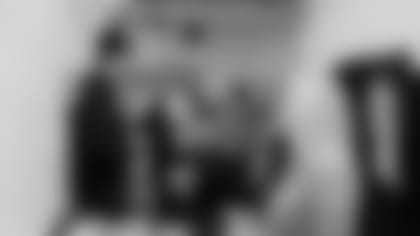After being unable to find his breath one night more than 20 years ago despite desperately twisting himself into a tripod, Patrick Clausen found his life's work. He went from shipping and receiving to respiratory therapist. The pandemic's year-long deep breath has taken him from healthcare worker to hero.
"It's been confusing and frustrating. It's tough," says Clausen of the chameleon killer known as COVID. "It's such a weird virus … It's completely opposite of what should be going on."
But Clausen turned up on the right side of things Wednesday. He's one of 11 employees from TriHealth, the Bengals' official health care partner, who received recognition for his work in the pandemic and won an at-home viewing package from Bose and a virtual meet-and-greet with Bengals quarterback Joe Burrow.
"It was awesome. It's always good to help give back to people that are making life go on right now. Always good to brighten their day," Burrow said Wednesday after his sessions. "A lot of them talked about how busy it was. Some people are working on Sunday. COVID doesn't slow down. These front-line workers have to push through and help these people and that's what makes them so special."
It's not lost on Burrow that the pandemic has multiplied the hungry in America, a cause to which he dedicated himself when he accepted the Heisman Trophy a good three months before COVID attacked.
"It's made a lot of people jobless and taken food off those families' tables," Burrow said. "It's (a problem) we need to tackle … That's why I'm with Bose. They want to give back."
The Bengals are also sending four frontline TriHealth workers to Sunday's Super Bowl LV in Tampa, Fla., as part of the NFL's salute to what the league has billed as "Healthcare Heroes."
That's a rare understatement during a Super Bowl week always hunkered down in hyperbole. Clausen, 55, and his medical teammates have been in hand-to-hand combat as they learn on what has become the most challenging of jobs.
"It's been a roller coaster. Just when you think you've got it, boom, you hit that drop. It's been a rough last few months," Clausen says. "We're learning different things, trying different things. Reading constantly different articles you can find. I'm always trying to look up things. See if there's a new mode of ventilation or therapy out there that somebody else is doing that we could use or that we haven't thought of. We're talking to the doctors daily, hourly.
"I truly feel that I work with the best group of RTs, Drs., RNs and all the staff from Bethesda North," Clausen says.
Burrow and Clausen could both use the break from their weekly grinds. Burrow is rehabbing his reconstructed left knee in the depths of Paul Brown Stadium. Clausen is roaming the halls of Cincinnati's Bethesda North Hospital as a part-time researcher, a part-time nurse, a part-time counselor and a full-time warrior. He has received high grades from the hospital for going above and beyond, from suggesting treatments while attending doctors' rounds to checking X-Rays to making sure patients are comfortable.
"Their work is so intense," Burrow said.
Multiple times, Clausen says, his voice has been the last one heard by a patient. With no visitors allowed, he's also heard the most wrenching of good-byes on FaceTime just before he inserts the ventilator that silences the person in the bed.
"The last one I remember, there were three different voices all praying for their loved one. It was not easy to hear," Clauson says. "You just try to reinforce, 'you're in good hands, you've got the best care you can get. We're going to do our best to get you through this,' and try to lift their spirits."
In the end, he admits, all you can do is "hold back the tears and try to be strong."
Even though Clausen didn't decide to become a licensed respiratory therapist until he was 32, he just knew at some point he was going to end up working in a hospital after spending so much time in them while growing up in Mason City, Iowa.
At age five he was diagnosed with juvenile rheumatoid arthritis. At age 10, he figures he became one of the youngest ever to have cataracts surgery. When his parents were told he couldn't play contact sports for fear of a detached retina, it "crushed me. I love sports. My father drove a truck all week and when he was home on the weekends his idea of a good time was watching sports and that's what I did."
There were the Vikings and Twins to watch in neighboring Minnesota. It's hard not to become an avid college wrestling fan growing up in Iowa and he fell right in line. His uncle worked for a company that had his favorite baseball player, Johnny Bench, as a spokesman and an autograph baseball solidified the Reds as his National League team long before he married a Dayton girl and settled in Cincinnati in the late 1990s.
But Clausen didn't go to an NFL game until the Vikings came to Cincy for the PBS opener in 2005. His buddy wore a Vikings jersey underneath a Bengals jersey and alternated shirts according to which team had the ball. By the time Vikings quarterback Daunte Culpepper threw his fifth interception of the day in the Bengals' 37-8 win, the guy was just wearing the Bengals jersey.
He also watched his father give up cigarettes too late to prevent emphysema and agonized with him while he could barely walk ten feet. He also saw a nephew hospitalized for his asthma. When Clausen had his own episode that was later diagnosed as asthma, he felt the push to help people breathe.
But what he learned at Cincinnati State didn't prepare anyone in the field for this.
"The biggest thing for respiratory therapists is not being able to oxygenate these patients the way we're used to," Clausen says. "Doing the things we know to do and it doesn't work has been the hardest part and trying to cope with the fact we're not fixing them, it's just going to take time.
"A lot of these people end up on 100 percent oxygen, which should turn them around. But we still see their oxygen levels lower than what a normal person should be able to tolerate. And the patient still sits there and talks to you like nothing's going on."
Which makes it so frustrating. Which is pretty much what Clausen told him when Burrow observed how tough things must be. Clausen had time to ask Burrow about his own challenges with the knee. Getting it ready, he said. They talked about the package Bose sent as Clausen opened it.
Noise reducing head phones. The Bose TV Speaker soundbar. Gift cards to local restaurants. Super Bowl merchandise.
"He seems sincere, he seems like a nice kid," says Clausen, who broke in following the Vikes of Fran "The Scram," Tarkenton but now likes how Burrow runs a game.
The head phones should come in handy since Clausen figures he's got about 1,500 songs on a playlist that tilts to classic rock. He usually goes to bed listening to an old album, like a couple of go-tos, Kansas' "Leftoverture," and Pink Floyd's "Dark Side of the Moon."
"Those head phones will take me back to my high school days," Clausen says.
That was back when he watched the nurses and doctors take care of him. Now there's a different track and even though there are days that seem like the other side of the moon, it is folks like Clausen that keep the sun coming up.
"Just knowing I'm trying,' he says, "keeps me going."








